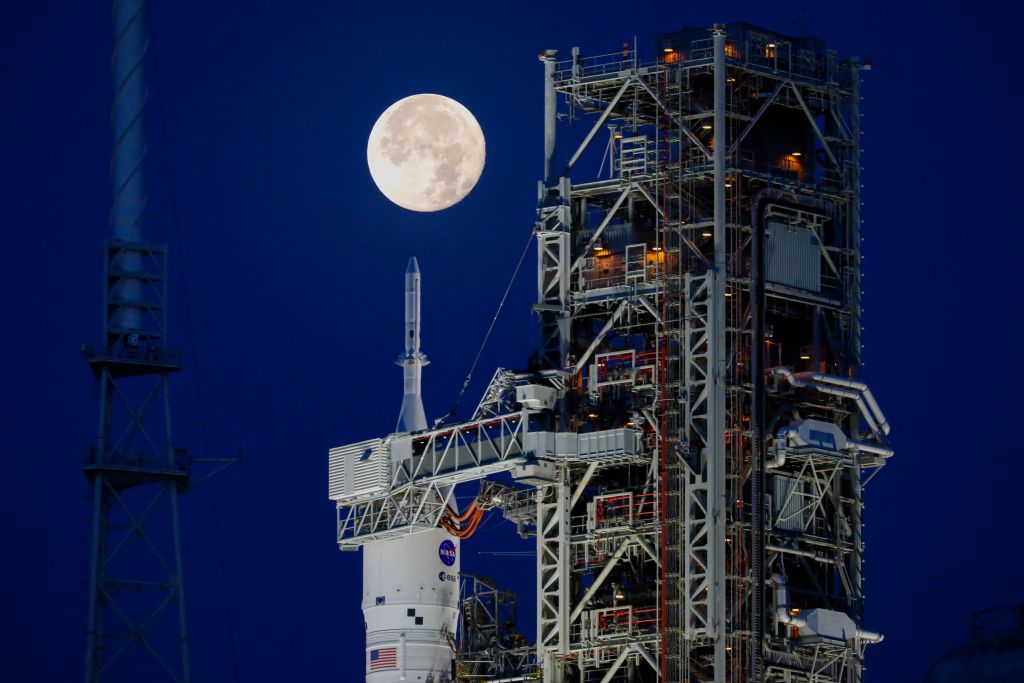
NASA has been asked to do a lot of things in the 64 years it’s been a federal agency, and on the whole, it’s delivered the goods. Beat the Soviet Union to the moon? Check. Build a fleet of reusable space shuttles? Check. Oversee a 15-nation collaboration that built a football-field sized International Space Station? Check.
But there’s one thing NASA has never been asked to do, and that’s a very good thing because it can’t: turn a profit.
As with every other branch of the government, the space agency’s money flows only one way: out. And there was a time that Congress was only too happy to cut seemingly endless checks that allowed NASA to keep spending. In 1966, at the peak of the race to the moon, the space agency’s budget was $5.9 billion—$44.89 billion in 2022 money—representing 4.4% of the total federal budget. But the space fever cooled after Apollo 11 stuck the first lunar landing in 1969, and ever since then, NASA funding, relative to overall government outlays, has grown smaller and smaller, today representing just over 0.4% total federal spending.
Even with those reduced resources, the NASA of today has been directed to do something the NASA of the 1960s never was: In 2020 and again this year, the space agency was required to file a detailed economic impact report, tallying the jobs created, the tax revenue generated, and the overall economic stimulus that NASA spending had on the U.S. economy at the local, state, and federal level. This week, NASA released its report for fiscal year 2021 and the numbers—at least to hear the space agency’s own bean counters tell it—are impressive.
NASA’s fiscal year 2021 budget was $23.3 billion and that spending, according to the report, generated a total of $71.2 billion in economic activity nationwide via contracts with private sector contractors, research and development deals with domestic and international companies, hiring of government and private workers, and more. NASA activities supported or created 339,600 jobs nationwide and generated nearly $7.7 billion in federal, state, and local taxes. Forty-six states saw an economic impact of at least $10 million, and of those 46, nine saw a revenue boost of $1 billion or more
Drilling down further, it was the Artemis program—which aims to have astronauts back on the moon in this decade—that performed most impressively, generating nearly $2.2 billion in tax revenue, contributing nearly $20 billion of the overall $71.2 billion in economic impact, and producing 37,000 jobs nationwide. Less flashily, NASA’s climate change research produced nearly $810 million in tax revenue, and contributed just under $8 billion in economic impact. Much of the revenue reported is generated by public-private partnerships—and there are a lot of them: NASA has 700 active partnerships with non-governmental companies in 44 of 50 states.
No surprise, NASA Administrator Bill Nelson crowed about the numbers. “Investment in NASA’s missions is investment in American workers, American innovation, and American companies,” he said in a statement that accompanied the release of the report. “NASA may be a small federal agency, but we punch above our weight.”
What can’t be entered on a spreadsheet, of course, are the larger, non-fiscal dividends space exploration pays. It’s impossible to put a dollar figure on the wonder that the latest images from the James Webb Space Telescope inspire; on the discoveries the Perseverance rover is making on Mars; on the 1960s-era thrill that will take hold across the nation when the first Artemis astronaut presses the first boot print back on the moon as early as 2026. Nelson is right that NASA is a small agency, but it has a big impact—one that has always gone well beyond mere economics.
This story originally appeared in TIME Space, our weekly newsletter covering all things space. You can sign up here.
More Must-Reads from TIME
- Cybersecurity Experts Are Sounding the Alarm on DOGE
- Meet the 2025 Women of the Year
- The Harsh Truth About Disability Inclusion
- Why Do More Young Adults Have Cancer?
- Colman Domingo Leads With Radical Love
- How to Get Better at Doing Things Alone
- Michelle Zauner Stares Down the Darkness
Write to Jeffrey Kluger at jeffrey.kluger@time.com